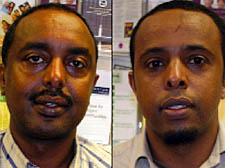|
|
 |
| |

Yussuf Ahmed and Abdul Ali |
We must divert our teenagers away from violence and drugs
The shooting of a teenager in Archway last week focused attention on Islington’s Somali community.
Here, two men who came to this country as refugees write of the challenges facing younger Somalis
DICTATOR Muhammad Siad Barre took over Somalia in a military coup in 1969. He oppressed civil society. In 1977 we went to war with Ethiopia but superpowers became involved and the Somali army was defeated.
When a country goes to war and is defeated, things change. The people, the army and politicians began to oppose the dictator, new ideologies were talked about. In the civil strife that followed, more than 60,000 people died and others fled to Ethiopia. That began the influx to England.
The majority of people who came over had higher education and money to buy tickets. They were business people, civil servants, military personnel and professors.
They didn’t know where to start, their qualifications were not recognised. They felt useless, falling from a position of status to being just a refugee. It was very painful. I went through that stage. I came as a refugee but all my family were back home.
The older generation came with qualifications but had to start from the bottom. That brought conflict within families. They had lost everything, which led to an identity crisis. Even the roles of men and women were different back home. They struggled and it caused a lot of separations. People tried to keep families intact. Even those who separated tried to rebuild their families. Few went to counselling because they didn’t know what it was.
Most got refugee status, and the Home Office facilitated family reunions. But they weren’t getting the support they needed. There was homelessness, problems with education, health and unemployment.
They were getting jobs as cleaners and becoming security officers.
The elderly tried to survive, some went to English classes, tried to set up businesses. A good number are working as bus drivers and running internet shops. Some went into professional jobs but mainly the younger ones.
Many who came here were single mothers. Every father tried to send his family first with the little resources they had at that time. The mothers had problems, not knowing the language and the system and not being able to challenge their children. Should they allow them to mix with other cultures?
They are here for their children to succeed but a good number are going to a different world which the mothers don’t understand.
Islington Somali Community is the oldest organisation of its kind in Islington, where there are at least 5,000 Somalis. We set up in 1990 and we’re supporting refugees, helping them get their benefits, entitlements and to learn the law of the country. We have formed youth, elderly and advice projects. Things are much better now.
YUSSUF AHMED
Coordinator, Islington Somali Community
I CAME to England aged 14 and went to an Islington school, where I was made welcome. But some youngsters suffered because of the language and education. Some got bored. Other students bullied them. You have to be tough in school, so the only way to communicate is violence. We would get in fights.
Children pick up the language quickly. If they get involved in drugs the parents won’t understand. They can deal in front of them. The parents know nothing about it.
We contacted the drugs team in Islington and organised a conference, displayed all sorts of drugs and educated parents on the signs and symptoms to look for.
Now, when parents see young people hanging around with different cultures they think they are doing drugs, they think they will end up in the police station. There are gangs within the Somali community fighting each other and others fighting other communities. I think it’s territorial.
There’s a lack of support for young people. Some have been excluded from school. The only thing they know is violence and drugs.
We organise football teams for them. Many have played against other communities and started to integrate properly. But we’ve had to turn some people away. We don’t have the resources.
On May 31 we had a conference for young Somalis. MP Jeremy Corbyn spoke, the police explained stop-and-search and members of council departments attended. It was very successful.
Thirty young people participated, some were successful, others were from the drug world and we had helped them to come here.
We have run several conferences, helping parents and police to understand each other and their children.
We know there is trouble out there and it’s not only among Somalis. There is gun and knife crime across London, but we’re working with parents, Safer Neighbourhoods police teams and young people, to find out what’s causing these problems. That’s why we are organising conferences and football teams – to try to divert them from crime.
ABDUL ALI
Youth worker, Islington Somali Community
|
 |
|
| |
| Your Comments : |
| |
| |
| |
|
 |
|